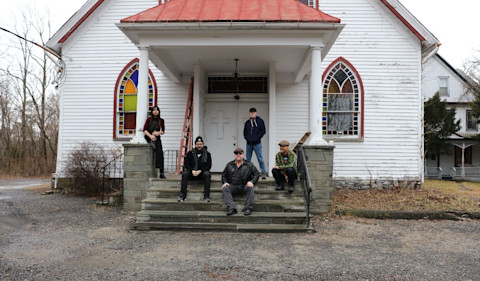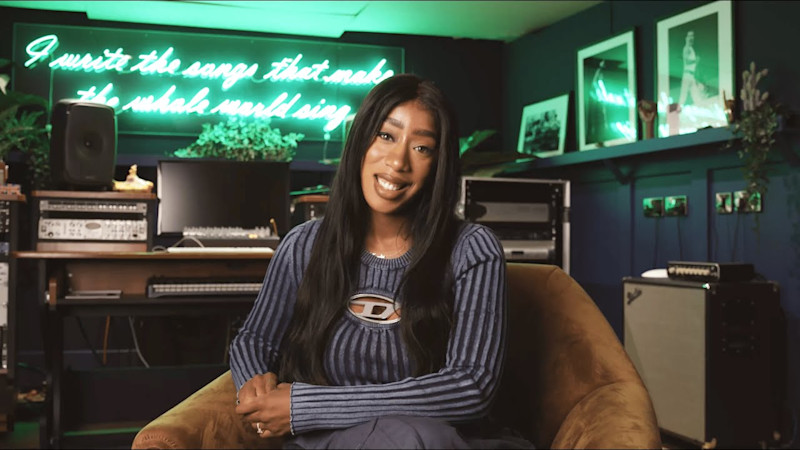"So many people are probably experiencing their own gender struggles and just don't know anyone else who is,” says singer/songwriter Joanna Sternberg, who identifies as gender neutral. “So the minute that you hear someone else is going through it too, it completely opens the door to feeling better and feeling free, and accepting yourself.”
Like the film and TV worlds, the music business is an ostensibly liberal-minded industry that's nevertheless dominated by cis/hetero people who have never even had to think about their place on the gender spectrum. Sternberg's upcoming new album, Then I Try Some More, simultaneously reflects the pain of being viewed as "other" by most of the world and provides a source of strength and solace for those with similar struggles.
With a combination of emotional nakedness and expert craft, New York City native Sternberg writes songs that invite comparisons between Sternberg and West Coast troubadours of the Boomer generation, like Carole King, Neil Young, Judee Sill, and early Randy Newman. And with Conor Oberst's Team Love label making Then I Try Some More Sternberg's first widely released record, they have an opportunity to bring messages about the quest for tolerance to a broader bunch of ears.
Finding transcendence in song
Sternberg began seriously pursuing the singer/songwriter route about six years ago. "I always wanted to write songs," they say, "but I never thought I could write properly. But I listened to Elliott Smith for the first time, and I found myself wanting to write songs about my feelings just because the effect his songs had on me was so moving."
There's an undercurrent of blues at the heart of everything Sternberg does, a quality that creates the sense of listening to an old soul. The songs on Then I Try Some More were ultimately inspired by the ability of blues singers to transform their troubles into transcendent music that brings people together. "That's why I want to play music," says Sternberg.
"Don't You Ever," a song that rides the line between lament and reassurance, deals with both feeling out of place in a cisgender society and a more universal loneliness. "At the time [that I wrote it] I was actually seeing someone," says Sternberg, "but I felt more alone than I ever had in my whole life because this person wasn't nice to me. When we were getting together I told this person, 'Hey, just so you know, I don't identify as a woman or a man,' and he's like, 'Oh yeah, that's cool,' but then later on when he dumped me he was like, 'I want to be with a woman.' The whole relationship I just felt really judged for it. [That song] is for everyone, because everyone feels lonely—but we're not alone, because we're all lonely."
As someone who's felt gender-neutral pretty much since birth, Sternberg has a whole lifetime of what Jews call tsuris (woes) to draw from. "‘You Have Something Special’ is about bullying," they say. "I remember in middle school I got beaten up because they thought I was a boy—they thought I was weird. I feel like I've been bullied all my life. I'd be offended if someone thought I was a boy, growing up, and I'd be offended if someone thought I was a girl. Only when I got good at music did I really get friends."
Sizing up the struggle
Pursuing a career in music without occupying a traditional gender role comes with unique challenges. Some are simply internal. "I tried to write songs with people's names in them,” Sternberg says. “I think I'm not able to do it, and maybe part of why I'm not able to do it is that... I just don't want to alienate anyone."
But most conflicts have external sources. "It's a lot harder trying to be a classical or jazz musician dealing with [gender neutrality]," says Sternberg, who—in addition to being a pianist, a guitarist, and a songwriter—is a gifted upright bass player. "I'm still playing jazz. If I'm playing songs by Irving Berlin or Cole Porter or even Thelonious Monk... it's from a time when there weren't publically trans people as much or at all; it's from a more homophobic, different time. And the traditions are that on gigs, if you're a girl, you should wear a dress and makeup.”
Sternberg explains that they’ve been rejected by bandleaders because they don’t present themselves as a sex object. “They see me, they have no use for me, they don't want to have sex with me—so why am I there?” they say. “This is really harsh, but I know it's true."
While the singer/songwriter world is less overtly judgmental, it's not without its gender issues. "The singer/songwriter realm is funny," says Sternberg, "because people are actually sort of the opposite. If a man dresses feminine, people want to make sure he's actually gay. They want you to be authentically queer, and if you're not, they might have a problem with you. So the singer/songwriter world is judgy almost in the opposite way sometimes. Like, Ani DiFranco, I remember when a lot of her lesbian fans went against her when she went with a man and had a baby. It's kind of funny—like, she's not allowed to do that?"
The process of bringing Then I Try Some More to a wider world through promo and performances also means there's a bigger group of people out there to make judgments. Something as basic as getting people to accept their preferred pronouns can be difficult. "I had a thing in Stereogum about my second single," says Sternberg, "and they gendered me properly—they said ‘they’—but someone wrote in the comments, 'Wait, “they?” What are you talking about?' That was not fun to read, but I'm expecting it."
Sternberg’s musician peers aren’t necessarily a source of support. "The good news is that I'm the only one in my band," says Sternberg. "I'm just solo, so I don't have to deal with the musicians; I think that's harder than the public, playing with musicians who don't accept you, who are maybe not so nice to you, which I've experienced a lot. If someone in the audience makes fun of me or thinks I look weird, that's easier to me than [getting it from] someone I'm playing music with."
Solace in validation
Besides writing songs that reach out to kindred spirits, Sternberg wants to combat gender-based bigotry just by bringing it out into the open. "I think it's great to talk about it," they say, "because I think that's the only way it'll ever be fixed.”
Sternberg notes that it’s a hopeful and helpful sign that more celebrities are coming out as trans, but that they’re still troubled by the knowledge that many people who are struggling with gender identity fear for their safety if they open up about it. “I really connect with it, so I try to write songs with that idea," they say.
Sternberg's ultimate desire is to be as inclusive as possible, reaching out to any and all open ears and minds. "Even if I write a song and it's about me, if I design it to be connected to someone who is gender fluid… I also make sure that it could [speak to] anyone who needs it. People who have gone through that struggle [have] told me the songs really helped them. That just validates why I did it—that's my dream come true, that I got that response. I don't care what else happens."
The album release party for Then I Try Some More *will be at The Glove in Brooklyn on July 12. Anyone interested in commissioning artwork from Sternberg can make contact through www.joannasternberg.com. *
—Jim Allen






